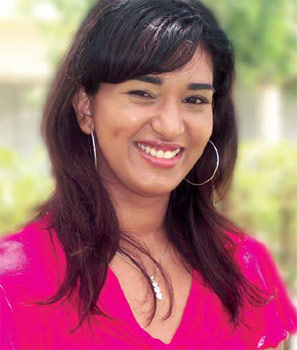 |
 |
 |
|
April 2009
|
High Voltage Girl: UWI honours student wins international engineering award
Her dream was to be an astronaut, not uncommon for 12-year-olds, but her mother said: NO. It was her grandmother who brought her back information on NASA, the American space programme, and from reading it she realised that all the astronauts were engineers. So although she relinquished the astronaut ambition, when Purdy Mohammed enrolled at The University of the West Indies (UWI) it was at the Faculty of Engineering. Soon, she found she wasn’t too keen on the computer aspect, “I wasn’t good at it,” she confesses, but she liked the electrical element, and by her third year when she had to do Industrial and Commercial Electrical Systems under the tutelage of Prof Chandrabhan Sharma, she found it “exciting,” admitting that she was turned on by how empowering electricity could be, and that “the idea of dealing with all that high voltage stuff” just lit her up. Purdy says she had been inspired by seeing the possibilities involved in efficiently channelling this source of energy on a national scale, and she resolved to get firstclass honours at the end of her BSc. It meant studying for practically 16 hours a day in her final year, but it was worth it; she graduated with distinctions, and is now taking a break before resuming a Master’s degree in Electrical and Computer Engineering in the new academic year. She’s already decided that the component she wants to do is Power Systems and in the meantime, she is getting some practical experience on how this functions. She is working at T&TEC on some of their engineering projects, but she hopes to return to The UWI as a lecturer when she’s finished her MSc and PhD. Purdy’s prize was the Clayton Griffin Student Paper Award, recognised by the Institute of Electrical and Electronic Engineers (IEEE) through its Power Engineering Society. But she almost didn’t get it because she didn’t check her e-mails frequently enough and it was only on the deadline date she noticed that submissions were due. She had to send it immediately. It was her final year project paper, “Applying Demand Side Management to Trinidad Network,” dealing with issues facing our national electricity provider, T&TEC. She explained that it was initially premised on dealing with greater demands than supplies. “Before the economic crisis, we had forecast the load demands to be greater than what we could supply. For the next ten years, even the load demand will be twice as much as we can generate,” she says. “But with the economic downturn it will change, and we will have to re-forecast that. We need to install more generators but that will take some time [one to three years, maybe even five], so I used demand side management to explore three of six techniques.” Broadly, they come under the related areas of loadshifting: applying tariffs during peak times (7-9a.m. and 8- 11p.m.) to discourage electricity use; peak- clipping: similar in concept; and strategic conservation, which would be more of a public education campaign to encourage people to invest in energy-efficient appliances, and lowering their electricity consumption. It is a practical approach to a global problem, which is what the world needs; but surprisingly, despite her intensity, Purdy never thought the paper would win. She just didn’t believe that someone from a small place stood a chance, and that is simply shocking. (VB) |
